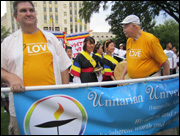Alabama UUs join fight against immigration law
Rallies, hearings, and trainings aim at dismantling far-reaching anti-immigrant measure.
The bill, HB56, was signed into law in June and was to go into effect Sept. 1, but has been stayed for a month while a federal district court judge deliberates its constitutionality.
The law, considered even more restrictive than Arizona’s SB1070, makes it a crime for anyone not to have papers showing that they are in Alabama legally. It also bars knowingly renting to, transporting, or hiring someone who is in the country illegally. Public schools would be required to determine the legal residency of students upon enrollment. Police would be required to check the immigration status of anyone they suspect of being in the state illegally.
Unitarian Universalists have joined a wide array of opponents of the proposed measure, including many faith community leaders who say it would prevent them from being “good Samaritans,” county sheriffs who say it would be difficult to prosecute, and contractors and farmers who would lose workers.
The U.S. Department of Justice, civil rights groups, and the leaders of Alabama’s Catholic, Episcopal, and United Methodist churches have all sued to block the law. U.S. District Judge Sharon Lovelace Blackburn could rule any time on its constitutionality. The month’s stay expires Sept. 29.
The Rev. Fred Hammond, minister of the UU Congregation of Tuscaloosa and acting director of faith development for the Unitarian Universalist Association’s Mid-South District, jumped into the fray as soon as the bill was proposed, testifying at hearings in Montgomery.
Hammond said UUs have done much of the organizing around the state against the law. It hasn’t been that difficult to gather a good crowd, he noted. “The legislators are determined it’s the will of the people, but there aren’t many people happy with it. Not the police who say a routine traffic stop will now take 45 minutes. Not the people who depend on day laborers. We’re already getting reports of produce not getting picked as migrants leave the state.”
He said he reaches out to those who support the law by telling stories that are “heartbreaking.” He noted, “When I tell people about why people come to this country, the fact that we helped cause this problem through our trade policies, and that there is no path to citizenship that does not take many years and require many thousands of dollars, then sometimes I see a lightbulb go off. It’s the stories that seem to make a difference.”
But there is resistance, too. Hammond recalls a woman who took the microphone after him at a public hearing. “She turned and looked at me and said, ‘That’s why we have Christian missionaries—to go into their countries to fix them so they don’t have to come here.’ With some people it’s clear that we see different Americas. So the conversations are hard. But we need to have them almost on a continual basis.”
Hammond added, “I try to find as many different avenues as possible to bring the issue up. That’s what we as UUs are good at, looking at various layers and sides of an issue.”
Around 4,000 people turned out for a Sept. 1 rally in Birmingham’s Linn Park, a place linked with civil rights rallies in the 1960s. There were smaller rallies in other cities.
Helen Rivas, a member of the UU Church of Birmingham and a longtime advocate for immigrants, has helped organize rallies and also works with immigrants. “Part of what I do is just try to keep immigrants from being too depressed and panicking. The way that people are being treated—I don’t want to draw too close a parallel—but it can feel a little like Japanese internment.”
She said she is encouraged by the way Alabama faith communities have taken a stand against HB56. “They’ve really stepped up. Many members of my congregation attend the rallies. In addition we’ve also conducted English as a Second Language classes and a study group on immigration.”
The Rev. Alice Syltie, minister of the UU Church of Huntsville, told participants at a Huntsville rally in August, “The law affects us all. We are all equal. We are here because we share one goal—the repeal of HB56. Alabama can do better than this. A higher law is the law of love and compassion for all humanity.”
Hammond said the immigration issue will be around for a long time in Alabama.
“We’re in this for the long haul. Whatever the judge rules, this issue will not be resolved quickly. As a nation we need to change the way we approach immigration in this country.”
He related a story from an immigration clinic that he participated in this summer, helping families create powers of attorney in case one or both parents were deported. One family had three children, two born in Mexico, and an infant born here. The parents wanted a power of attorney for their baby, so they could name someone to have temporary custody, if needed. Hammond said that the parents expected that if they were deported the older children would be deported with them.
“I had to explain that the family members might not all be detained or deported at the same time, and therefore they might not be able to care for their older children. I watched their faces as they grasped this,” Hammond said. “It was such a pained expression, a look of absolute fear of what their future might hold. It hit my heart in a powerful way. We need to stop this from happening.”
See sidebar for links to related resources.
Comments powered by Disqus







